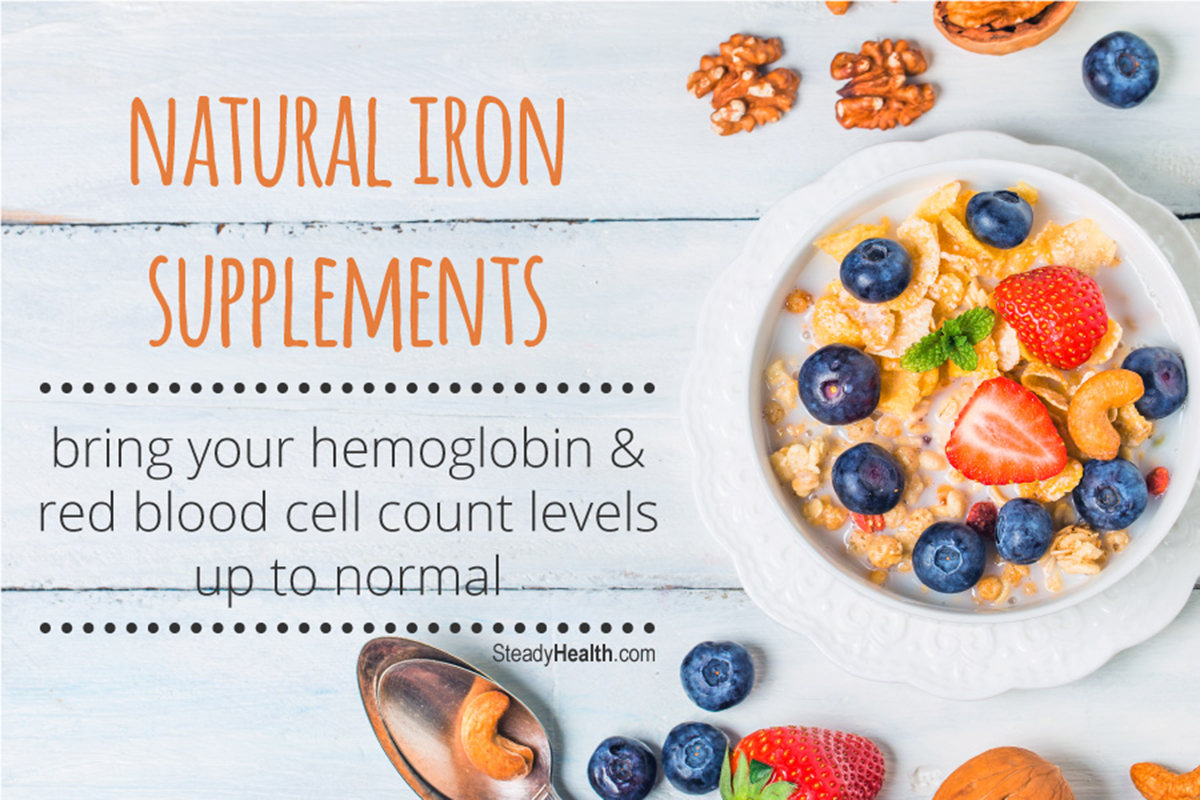If your doctor tells you that you are anemic, you are hardly alone. Even in a country where people are generally overfed, like the United States, at any given time about 4 percent of men and eight percent of women need high hemoglobin levels and higher red blood cell mass to fight anemia. These numbers are higher among African-Americans and pregnant women, and especially African-American pregnant women. [1] In countries where people eat less meat, and in countries where sickle cell disease is common, rates of anemia are even higher [2]. That's why doctors often recommend the natural iron supplements and foods that provide the iron the body needs to increase red blood cell mass.

What kinds of supplements and foods increase the body's supply of iron?
- Iron sulfate is cheap and effective, but it can cause stomach upset and worse. Sometimes iron pills cause an erosion of the lining of the stomach called gastritis [3]. Ferrous fumarate causes less stress on the lining of the stomach, but it also delivers less iron to the bloodstream [4]. Sometimes it's simply better to get iron from food.
- Meat is the best known of all natural iron supplements, because it the most readily available of all sources of heme- iron, the kind of iron the body can easily absorb, because of its content of blood. Beef, in particular, supplies other minerals that the body needs to make the enzymes that use iron, like zinc [5]. Surprisingly, scientists have not studied whether kosher or hallal meats, which have the blood removed, provide less iron to the body. They have studied whether meat in the diet results in higher iron levels than vegan or vegetarian diets, however, with mixed results. When women go on weight-loss diets, meat helps them avoid low iron levels [6]. Athletes have better iron levels when they eat a variety of foods, including meat [7]. The best iron levels, however, may come from a lacto-ovo-vegetarian diet (plant foods plus dairy and eggs), not from eating meat [8].
- Milk is the key to increasing iron levels without eating meat because it contains whey. Calcium usually interferes with iron absorption, but the calcium in milk does not because of the whey protein [9]. Add a source of vitamin C to the meal, such as a small cup of orange juice, and the calcium in milk does not interfere with the absorption of natural iron supplements at all [10].
No matter how much they need hemoglobin and red blood cell count levels to be higher, however, some people just aren't going to patronize the butcher shop. They refuse to consume meat or milk for ethical reasons. These same people often find objections to iron supplements, too. It's possible to get all the iron you need from a vegan diet. In fact, lower iron levels in vegetarians may even account for their lower rates of diabetes and their tendency to resist infectious diseases [11]. It just takes a little more planning.
- Nori (seaweed) and wild mushrooms raise vitamin D, folic acid, vitamin B12, vitamin B6, and iron up to an acceptable level [12]. You won't be supercharged from these nutrients when you eat a vegan diet, but you won't suffer an overdose, either. In fact, even if you are an omnivore (you eat meat), these foods can help you get enough of the other nutrients your body needs to use iron. With a vitamin B12 deficiency, there is no amount of iron that will correct anemia. But with these foods, you won't have a B12 deficiency, and the answer to the common question "Is vitamin B12 safe" is a resounding "Yes."
- Fermented soy foods help the body absorb iron. These foods include miso, tempeh, natto, and fermented (but not regular) tofu.
- Whole grains should be soaked before cooking. The water they are soaked in should be thrown away. This leaches out some of their phytate, which interferes with the body's absorption of iron, calcium, and other minerals in the grains and in other foods.
- Beans should be eaten as sprouts whenever possible. The sprout changes some of the minerals in the bean into a more digestible form, and sprouts don't contain some of the soap-like irritant chemicals found in beans. Sprouting makes iron more available from the bean itself and keeps its lectins from interfering with the absorption of iron in other foods.
- Coffee and tea should not be consumed with meals. The tannins in these beverages bind to iron so that the digestive tract cannot absorb it. There are also tannins in herbal teas. Coffee, tea, and herbal tea are OK after meals or between meals, but it is important to give the digestive process time to absorb iron and other nutrients first. [13]
Iron alone is never enough for higher hemoglobin levels or greater red blood cell mass to cure anemia. Iron always requires dietary cofactors that you are easy to obtain with good meal planning. Eat a variety of the right foods, and hemoglobin and red blood cell count levels often will take care of themselves.
- Photo courtesy of SteadyHealth.com


Your thoughts on this